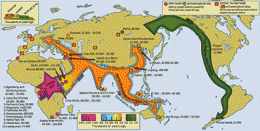Humans spread out of Africa later

Modern humans spread out of Africa 20,000 years later than previously thought, according to new genetic research just published.
Scientists, including the Natural History Museum’s human origins expert Professor Chris Stringer, re-examined how scientists get dates for key events in human evolutionary history. They did this by finding new ways to analyse the data obtained from mitochondrial DNA (mtDNA).
Mitochondria are the tiny structures in each human cell that produce the cell’s power. They contain their own DNA and this is inherited through the mother.
‘We tried alternative ways to date recent episodes in human evolution, such as our split from Neanderthals, and we found these events occurred more recently in time,’ says Prof Stringer.
The new analysis revealed modern humans separated from Neanderthals around 300-400,000 years ago rather than previous estimates of 500-600,000 years.
The research suggested that modern humans migrated out of Africa between 55-60,000 years ago rather than the previous dates of 70-80,000 years.
They also got more recent dates for other crucial events such as the age of our African ancestral mother, known as mitochondrial Eve, from who all recent humans (Homo sapiens) descended. She was found to have lived around 110-130,000 years ago, rather than previous estimates of 150,000-200,000 years ago.
‘The new dates are consistent with the most recent fossil and archaeological data for Neanderthal evolution, our exit from Africa and our arrival in Asia, Australia, Europe and the Americas,’ says Prof Stringer.
‘And they also cast doubt on ideas of an early exit from Africa towards China and Australia.’
More information: Chris Stringer, Phillip Endicott, Simon Y.W. Ho, and Mait Metspalu's Evaluating the Mitochondrial Timescale of Human Evolution paper is published in the journal Trends in Ecology and Evolution.
Source: American Museum of Natural History (news : web)

















